Bulletin N° 736
Subject
:
CHANGE: ADAPTATION OR EXTINCTION ; WHAT SKILLS FOR SURVIVAL ?
4
February 2017
Grenoble, France
Dear
Colleagues and Friends of CEIMSA,
It is
during a social debacle that the various strata of any society, in any era,
become visible. The logical and social component parts of a social structure of
past societies are easily identified by historians, and nowhere is this better
done than in Volume 2 of Fernand Braudel’s
classic work, “Civilization & Capitalism, 15th – 18th
Century”. In Chapter V of this Volume, The Wheels
of Commerce, which he entitles, “Society: A Set of Sets,” the
famous historian conducts an anatomy lesson on corpus feudalis :
The best description of ‘feudal society’ is
still to my mind Georges Gurvitch’s brief sketch
(rapid and authoritarian as it undoubtedly is) based on a careful reading of
Marc Bloch’s marvelous study but developing its conclusions in a very
individual way. Shaped by centuries of sedimentation,
destruction and germination, ‘feudal’ society is in fact a combination of at
least five ‘societies’, five different hierarchies, existing side by side.
The most ancient and fundamental of these, now dislocated, was seigniorial
society, its origins lost in the mists of time, which bound together local landlord and peasants. Less ancient, but with historical
origins in the Roman Empire and spiritual roots plunging even further back, was
the theocratic society constructed by the Roman Church with fortitude
and tenacity, for it had not only to conquer but also to keep and thus
constantly control its faithful. A large share of the surpluses of early Europe
went into this huge and far-flung enterprise: [W]ere cathedrals, churches,
monasteries, church revenues an investment or waste of capital?
Thirdly, a younger society, pushing its way between the others and
seeking a foothold, was taking shape around the territorial state. The
latter had foundered with the last Carolingians, but the wreck as so often was
not total. The fourth sub-sector was feudalism in the strict sense, a
tenacious superstructure which insinuated itself into the upper reaches of
society and the gaps vacated by the failure of the state: it united feudal
lords in a long hierarchical chain and sought to control and maneuver all
society through the hierarchy. But the church was not entirely imprisoned
within the net; the state would one day tear the mesh apart; and as for the
peasant, he often lived on the margin of this agitation in high places.
Finally, the fifth and last system, to us the most important of all, consisted
of the towns. They appeared or reappeared, from the tenth or eleventh
century, as states apart, societies apart. They were the daughters of a distant
past --Rome often lived again in them. But they were also daughters of a
present which helped them to blossom: they were new creations –the product in
the first place of a colossal division of labor (between town and countryside),
of consistently favorable economic circumstances, of the revival of trade and
of a re-emergent money supply. Through money, a major multiplier, a sort of
electric current was directed towards the West from Byzantium and Islam, across
the great stretches of the Mediterranean. When the sea later went over to
Christendom, this meant both revival and upheaval for early Europe.
This was not one society then but several,
coexisting, resting on each other to a greater or lesser degree; not one system
but several; not one hierarchy but several; not one order but several; not one
mode of production but several, not one culture but several cultures, forms of
consciousness, languages, ways of life. We must think of everything in the
plural. (pp.464-465)
Such an
anatomy of past societies can only help us in our approach to understand
present social conditions. By recognizing the various layers from the past upon which we now exist,
we are more informed about the stabilities and vulnerabilities on the ground where
we are standing. The rapidly
changing context, of which we are a part, will inevitably modify our
relationships, creating new social class solidarities and new political/cultural
alliances.
Nothing
is more permanent than change!
The 13 items below will provide CEIMSA readers with insights into
the changes –both large and small-- that now confront us, almost on a daily
basis. Adapting to these changes, and knowing where they come from and what
they imply, is the challenge that we face collectively today.
Sincerely,
Francis Feeley
Professor emeritus of American Studies
University Grenoble-Alpes
Director of Research
University of Paris-Nanterre
Center for the Advanced Study of American Institutions and
Social Movements
The University of California-San Diego
a.
Greenland Ice Sheet
Melting 600 Percent Faster Than Predicted by Current Models
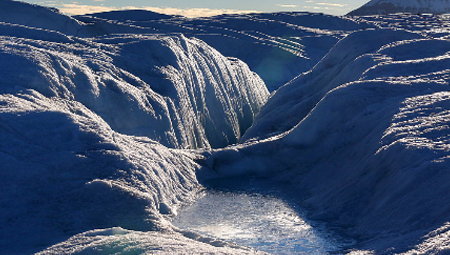
The climate is very capable of
changing to another stable state unfavorable to the human species, and this is
a real danger of our global experiment with unmitigated greenhouse gas emissions,
says Arctic ice specialist David Barber
===========
b.
Trump's Cabinet
Represents the Fusion of Big Oil and State
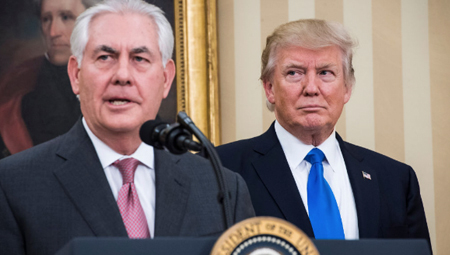
http://therealnews.com/t2/story:18281:Trump%27s-Cabinet-Represents-the-Fusion-of-Big-Oil-and-State
Jamie Henn of 350.org says we can't just fight
Trump; we also must put pressure on state and local officials while challenging
the political power of the fossil fuel industry
+
https://www.democracynow.org/shows/2017/2/3?autostart=true
===========
c.
Rebel Cities, Urban
Resistance and Capitalism:
a Conversation with David Harvey
Emanuele:
You begin your book Rebel Cities: From the Right to the City to the Urban Revolution,
by describing your experience in Paris during the 1970s: “Tall building-giants,
highways, soulless public housing and monopolized commodification
on the streets threatening to engulf the old-Paris… Paris from the 1960s on was
plainly in the midst of an existential crisis.” In 1967, Henry Lefebvre wrote
his seminal essay “On the Right to the City.” Can you talk about this period
and the impetus for writing Rebel Cities?
===========
d.
Syria, Interrupted Game Change
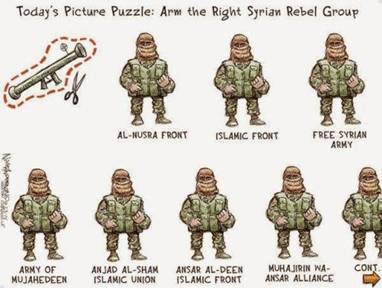
http://www.informationclearinghouse.info/46325.htm
by Jim Kavanagh
The recapture of Aleppo by the Syrian Arab Army and its allies marks a
turning point not only in the conflict in Syria, but also in the dynamic of
international conflict. For the first time since the dissolution of the Soviet
Union, the rolling imperial engine of regime change via American-led military
intervention has been stopped in its tracks. To be sure, it’s certainly not out
of service, even in Syria, and it will seek and find new paths for devastating
disobedient countries, but its assumed endgame for subjugating Syria has been
rudely interrupted. And in our historical context, Syria interrupted is
imperialism interrupted.
Let’s remember where things stood in Syria seventeen months ago. After a
four-year campaign, directed by the United States, thousands of jihadis in various groups backed by the US/NATO, the Gulf
monarchies, Turkey and Israel, were on the offensive. ISIS occupied Palmyra, Raqqa, and swaths of territory, and was systematically
raping, beheading, and torturing Syrian citizens and looting and destroying the
country’s cultural treasures. Al-Qeada/al-Nusra had triumphantly poured into the eastern part of
Aleppo, Syria’s largest city (and one of the oldest inhabited cities in the
world), were beheading and crucifying their newly-subjugated Syrian captives,
and were beginning their siege of the larger and more populous part of that
city. Turkey had commenced military operations on Syrian territory against
Kurdish forces (who had won significant victories against ISIS), and was
enabling the transit of foreign jihadis into Syria
and convoys of ISIS oil through its territory. Against these dispersed
offensives, the Syrian Arab Army was undermanned and overstretched.
===========
e.
Essential
Context about Trump’s Refugee Ban
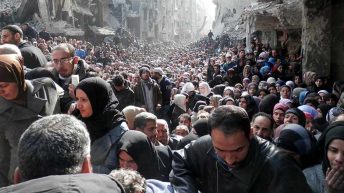
https://israelpalestinenews.org/essential-context-trumps-refugee-ban/
by Alison Weir
President Trump has issued an executive
order suspending entry to the U.S for people from Iraq, Syria, Libya, Somalia,
Sudan, Iran, and Yemen (the order is called “Protecting the
Nation From Foreign Terrorist Entry Into the United
States”). These same countries were the focus of the “Visa Waiver
Program Improvement and Terrorist Travel Prevention Act of 2015.”
===========
f.
Lies Promote
Trump's Economic War Against Iran
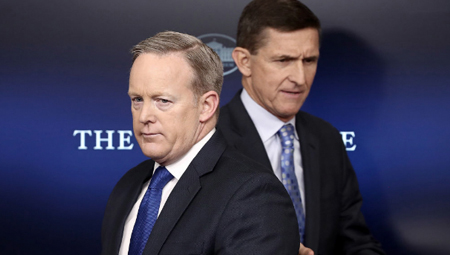
http://therealnews.com/t2/index.php?option=com_content&task=view&id=31&Itemid=74&jumival=18289
Trump's
National Security Advisor Michael Flynn's accusation that Iran's ballistic
missile test violated a UN resolution is not backed by any evidence, and Press
Secretary Spicer's allegation of an Iranian attack on a U.S. ship is a complete
fabrication - Paul Jay interviews Ben Norton
===========
g.
If U.S. Cared About
Muslims, They Would Stop Killing Them by the Millions
http://www.informationclearinghouse.info/46360.htm
by Glen Ford
Trump’s current ban on travelers affects
nations that were already targeted by President Obama, “a perfect example of
the continuity of U.S. imperial policy in the region.” The memo from State
Department “dissenters” contains “not a word of support for world peace, nor a
hint of respect for the national sovereignty of other peoples.
===========
h.
Secret Docs Reveal: President Trump Has Inherited an FBI With Vast Hidden Powers
https://theintercept.com/series/the-fbis-secret-rules/
by Glenn
Greenwald and Betsy Reed
===========
i.
On Reality Asserts
Itself
Bill Ayers joins
Paul Jay to discuss his journey from an apolitical life to the militant group
the Weatherman to social activism and organizing
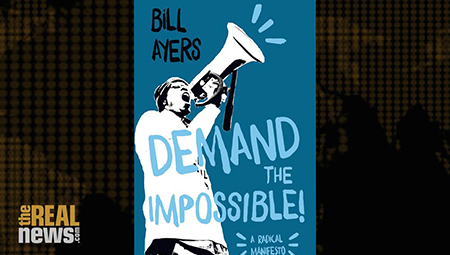
http://therealnews.com/t2/index.php?option=com_content&task=view&id=33&Itemid=74&jumival=1566
===========
j.
Discontent with
Politics of the Extreme Center Underlies French
Presidential
Race
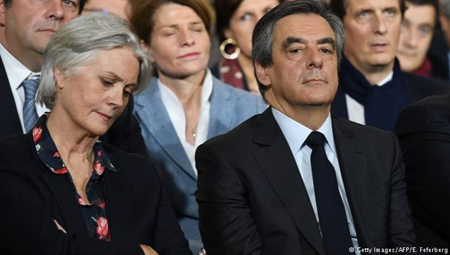
Left-wing
candidate Jean-Luc Melenchon could face a very
popular right-wing candidate in Marine Le Pen; if victorious, he would find himself
surrounded by hostile actors like how Syriza did when
they took power in Greece, says Renaud Lambert
===========
k.
|
Can the Democrats Build a Progressive
Movement Against Trump? http://therealnews.com/t2/index.php?option=com_content&task=view&id=767&Itemid=74&jumival=18193 |
|
|
Black
Agenda Report's Glen Ford says a progressive movement can't be build out of
the pro-war, pro-CIA, and McCarthyite politics
coming from Democratic leadership |
===========
l.
A “Color Revolution” Is Under
Way in the United States
http://www.unz.com/tsaker/a-color-revolution-is-under-way-in-the-united-states/
by The Saker
A
Russian joke goes like this: “Question: why can there be no color revolution in the United States? Answer: because there are no US Embassies in the United States.”
Funny,
maybe, but factually wrong: I believe that a color revolution is being
attempted in the USA right now.
===========
m.
Flailing Trumpsters
Upset a Hijacked Nation
http://www.commondreams.org/views/2017/02/02/flailing-trumpsters-upset-hijacked-nation
by Ralph Nader
The Trump Gang, hardly two weeks in the White House, is giving
strong, petulant signals that it is hijacking the checks and balances of our
democratic institutions. Coupling the Boss’s easily brusiable
ego, marinated in infinite megalomania, with ideologues harboring objectives
that would have frightened Nixonites and Reaganites alike, a runaway train is leaving the station.